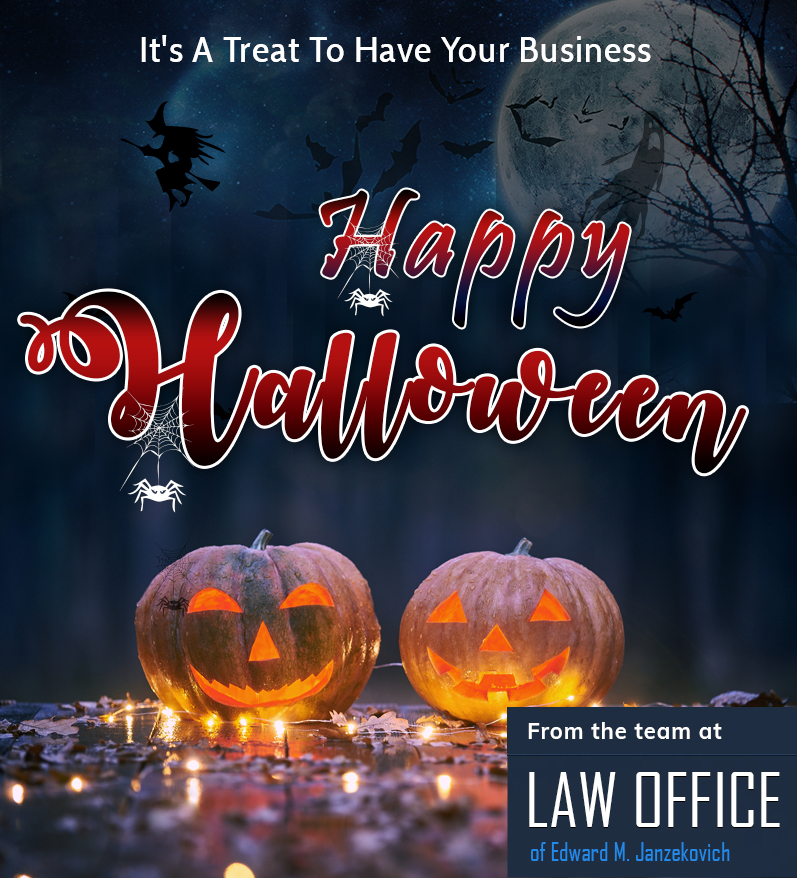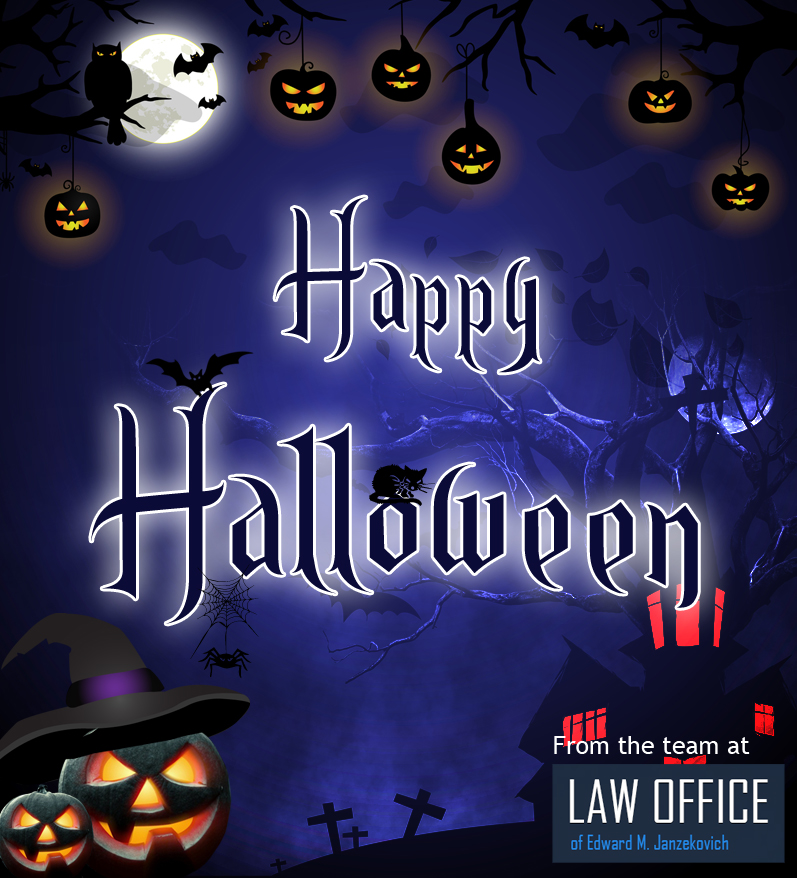 At this time of year we stop and reflect on what matters most: our families, our friends, and our relationships with trusted clients like you. Thank you for choosing us; we will continue to work hard in the new year to deserve your trust. We wish you all the blessings of a peaceful holiday with those you love.
At this time of year we stop and reflect on what matters most: our families, our friends, and our relationships with trusted clients like you. Thank you for choosing us; we will continue to work hard in the new year to deserve your trust. We wish you all the blessings of a peaceful holiday with those you love.
Happy Holidays from The Law Offices of Edward Janzekovich, LLC
Happy Thanksgiving

We set aside one day every year to give thanks, but here at Law Office of Edward M. Janzekovich, we are thankful throughout the year for the relationships that we have built with our clients. We value your trust and your confidence, and we are committed to helping you achieve your goals.
We hope that this holiday gives you a chance to reflect on treasured memories and cherished relationships. Happy Thanksgiving!
International Travel Restrictions If You’ve Ever Been Convicted of Drunk Driving
Are you thinking of traveling somewhere out of the country this holiday season or at any time in the future? Unfortunately, you may need to change your plans if you or someone you expect to travel with has a past DUI or DWI conviction. In addition to the numerous other severe penalties imposed on someone who is found guilty of drunk driving, a driver who is convicted can also be denied entry into certain countries simply because they had a DUI or DWI at some point in the past.
Travel restrictions can be an extremely important consideration for certain individuals, such as those who need to travel for work. Unfortunately, not being able to enter certain countries because of a past conviction is just one more thing that can make life more difficult for any driver who is caught driving drunk. This is in addition to the other penalties that can occur, which we frequently discuss here on the Edward M. Janzekovich law blog, such as severe fines, jail time, and loss of driving privileges. For some individuals, these penalties can mean the difference between being able to go to work or not being able to care for family members and loved ones.
Because a DUI/DWI conviction can have such life-changing consequences, we always recommend that drivers exhibit extreme caution when drinking. If you are pulled-over or arrested for drunk driving, it is important that you consult an experienced attorney as soon as possible. Even if you have already plead guilty to DWI or have been convicted, it is still possible for a lawyer to help in certain situations and have that conviction overturned.
Crossing the Canadian Border with a Past DUI or DWI Conviction
For New Jersey residents looking to travel abroad, Canada is often one of the closest and easiest choices. However, many people do not know that Canada has extremely strict border policies regarding travel into the country by non-Canadian citizens who have had a DUI conviction at any time in the past. The Canadian government reserves the right to bar any person from entering the country if they have ever plead or been found guilty of driving under the influence of alcohol or drugs. This is because Canada considers driving while intoxicated to be a serious offense, similar to a felony, even though it is treated differently in New Jersey. The official policy is: “Americans with a DUI record must seek a waiver of exclusion from Canadian authorities before traveling to Canada, which requires several weeks or months to process.”
Although having a past DUI does not mean you will definitely be turned away when visiting our Northern neighbor, there is a good chance that you will be turned away if you have a recent conviction. The border officers have a lot of leeway in deciding when to allow individuals in and when to turn individuals away. Border officials may be more lenient if an individual’s conviction is more than 10 years old, although there is no guarantee that such an individual will be permitted entry.
Furthermore, it does not matter if a person is trying to enter Canada by car, boat, plane or train – or what they will be doing in the country. There are well-known stories of Americans being denied entry even when traveling to Canada by ferry on a sight-seeing daytrip.
Finally, Canada is able to easily determine when an individual has had a past conviction because Canada is the only country that shares complete information with the United States regarding criminal databases, meaning that Canadian border agents have complete access to all criminal records. For this reason, it is especially important to be honest and not lie when discussing any past convictions with Canadian border agents.
Other Countries Where a DWI Conviction Can Affect Travel
In addition to Canada, there are a number of other countries where past DWI convictions may bar entry. Generally, travel into countries that are part of the European Union will not be affected. However, travel to certain Asian countries – such as China, Malaysia, and Japan – and countries in the Middle East.
Because these policies are country specific and subject to change at any time, it is important for you to specifically research the policies governing your intended travel destination. In some cases, you may even want to contact an immigration official to find out more information.
What Can You Do About a Past DUI/ DWI Conviction
If you have been convicted of drunk driving in the past, and now feel you need to have that conviction cleared from your record, it is important that you contact a knowledgeable attorney immediately. A good attorney will be able to review all of the facts and circumstances surrounding your past DWI case. The DUI lawyer will then be able to inform you about your options. In certain circumstances, the attorney may be able to file an appeal or make a motion to overturn the past conviction.
If you are in a situation where a past conviction – no matter how old – is preventing you from traveling, working, or being eligible for a job, this can often be the only way to change how that conviction affects your ability to live your life.
New Jersey DUI/DWI Lawyer Edward M. Janzekovich Can Help if You Have Been Arrested, Charged, or Convicted of Drunk Driving
If you have been convicted of drunk driving, you could face penalties that affect all aspects of your life. Some drivers deal with the penalties associated with DUI/DWI for the rest of their lives. For that reason, if you or someone you know has a DWI/DUI related issue or question, it is extremely important to contact an experienced DUI/DWI attorney immediately. A good drunk driving lawyer can make all the difference. To speak with an experienced New Jersey DWI/DUI lawyer about your situation, call us at 732-257-1137 or contact us online today. We serve clients throughout the state of New Jersey.
New Jersey DUI Attorney Discusses the Field Sobriety Vision Test, Also Known as the Horizontal Gaze Nystagmus Test
 If you are pulled over and arrested for DWI in New Jersey, the police have a few options for proving that you were driving under the influence of alcohol or drugs. Two of the things that police officers may do is (1) conduct a field sobriety test, or (2) use an official breathalyzer test, which is meant to determine scientifically if your blood alcohol content (BAC) is over the legal limit of .08%. Because the government is required to adhere to specific and complicated guidelines for administering and maintaining BAC tests and records, it is important that you retain an experienced attorney if you are ever arrested for a DUI. A knowledgeable DUI/DWI attorney will be able to review the records and may be able to have the BAC evidence thrown out so that it cannot be used against you.
If you are pulled over and arrested for DWI in New Jersey, the police have a few options for proving that you were driving under the influence of alcohol or drugs. Two of the things that police officers may do is (1) conduct a field sobriety test, or (2) use an official breathalyzer test, which is meant to determine scientifically if your blood alcohol content (BAC) is over the legal limit of .08%. Because the government is required to adhere to specific and complicated guidelines for administering and maintaining BAC tests and records, it is important that you retain an experienced attorney if you are ever arrested for a DUI. A knowledgeable DUI/DWI attorney will be able to review the records and may be able to have the BAC evidence thrown out so that it cannot be used against you.
If the BAC evidence is thrown out, or otherwise compromised or excluded, then the government will be required to rely on other evidence to prove that you were driving under the influence of alcohol or drugs, such as the field sobriety test. A police officer’s observations and notes regarding how a driver acts or appears, when combined with evidence of the officer’s experience in assessing impairment, can be used to convict a driver of operating a motor vehicle under the influence of drugs or alcohol.
Horizontal Gaze Nystagmus Test
In New Jersey, police officers may ask a driver to do a number of different exercises in an attempt to determine if the person is intoxicated, under the influence of any substances, or otherwise impaired, including standing on one leg, reciting the alphabet backwards, walking in a straight line, or following the police officer’s finger with the person’s eyes. Not all of the tests are admissible in court. The vision test, where a driver is asked to move his or her eyes from side to side, is considered scientifically reliable under the law. This is called the Horizontal Gaze Nystagmus (HGN) test.
Nystagmus is a term to describe fast, uncontrollable movements of the eyes – sometimes also referred to as dancing eyes. Impairment due to alcohol and the use of certain drugs can cause involuntary nystagmus. Accordingly, in the 1970’s and 1980’s, the National Highway Traffic Safety Administration (NHTSA) performed studies to determine if the HGN could be used to reliably determine if a person was operating a car while intoxicated or impaired by drugs, and the studies found the HGN test is 77% accurate in determining whether a person has a 0.10 BAC or more.
What Police Officers Are Looking for When Performing the Test
Police officers are provided with some training in how to perform an HGN test, including what signs of impairment to look for. The guidelines suggest that a police officer is checking for equal pupil size and whether the eyes are jerking involuntarily from side to side while at rest or while tracking an object from side to side. Three specific “clues” that officers are trained to look for include:
- The lack of smooth movement from side to side – bouncing rather than rolling smoothly.
- Distinct and sustained nystagmus when the eyes are held at maximum deviation and held for a minimum of four seconds.
- Onset of nystagmus when the eyes have moved less than 45 degrees to the side.
How a Lawyer May Challenge the Horizontal Gaze Nystagmus Test
Scientific and medical experts have concerns that the administration of the HGN test by police officers may be unreliable because these officers are not ophthalmologist, trained in the detection of eye movements and or eye pathologies. Some experts have also suggested that the NHTSA standards for performing the HGN test could lead to false results. One independent study concluded that, in a controlled laboratory test, police officers were wrong 41% of the time about whether a person with a .10% BAC experienced HGN.
Similarly, HGN can be caused by a number of other things, including injury, tiredness, illness, or medical conditions. In the case of Schultz v. State, a case from Maryland, the court recognized at least 38 medical conditions unrelated to alcohol that can cause HGN, including the flu, consumption of excessive amounts of caffeine, head trauma, some prescription drugs, and exposure to certain chemicals or toxins.
Because a police officer is looking at your behavior, appearance, and how you perform on these tests, your performance on any field sobriety test, as well as your ability to speak to the police officer and answer questions, can help in your defense against a DUI/DWI conviction. At the end of the day, these tests are not perfect and subject to human error. For that reason, it is important to always consult an experienced lawyer. A DUI attorney may be able to fight the charges against you or have the charges dismissed completely.
New Jersey DUI/DWI Attorney Edward M. Janzekovich Can Help if You Are Arrested for Drunk Driving
An arrest for driving under the influence of alcohol or drugs can have life-changing consequences for any driver. Such a charge, and possible trial, can also be extremely complicated, especially when specific tests or scientific evidence is involved. If you are charged with drunk driving or driving under the influence of any substance in New Jersey, an experienced DWI/DUI attorney can make all the difference. To speak with an experienced New Jersey DWI lawyer about your situation, call us at 732-257-1137 or contact us online today. We serve clients throughout the state of New Jersey.
Driving Under the Influence of Drugs, Including Cocaine, Heroin, Meth, and Other Substances in New Jersey
Under New Jersey law, N.J.S.A. 39:4–50(a), you cannot drive a motor vehicle if you are “under the influence… of a narcotic, hallucinogenic or habit-producing drug.” New Jersey courts have since expanded this law to include any substance that has produced a narcotic effect – and the law does not even require that the specific drug be identified. If you have used a substance that would change your normal physical coordination or mental abilities to the point that you can be considered a danger to yourself or others on the road, then you may be charged with driving under the influence of drugs, also known as DUID.
If you go to trial for a DUI/DWI charge, the State must prove beyond a reasonable doubt that you were operating a vehicle under the influence of some drug or mind altering substance. When it comes to alcohol, the standard breathalyzer test and field sobriety tests used to demonstrate that a person was driving drunk are well known. When it comes to DUID for drugs like cocaine, however, a case can be somewhat more complicated. The State may require expert testimony to establish that there were drugs in your system and that these drugs actually made you unable to safely operate your vehicle. For that reason, it is especially important to consult an experienced DWI/DUI lawyer, who will be able to identify if the State’s investigation into your charges was proper and who may be able to have your charges either dismissed or downgraded by discrediting this evidence.
How Does the State Prove Narcotic Use?
In a prosecution for driving while under the influence of drugs, the State will use observations and testimony to establish that a person was using drugs at the time he or she was arrested, as well as to show that the person was intoxicated. For instance, if a police officer suspects a driver of being under the influence of narcotics, the first thing he or she will probably do is request that the driver undergo a blood or urine test. This evidence would then be admitted at trial through admission of the person who performed the analysis or an independent reviewer. Barring exigent circumstances, New Jersey law does not require that a driver undergo a blood or urine test. The driver does have the right to refuse to participate in testing. To obtain a blood or urine sample, the police MUST either (1) gain the drivers voluntary informed consent (meaning the driver has the right to refuse) or (2) the police obtain a search warrant to force a driver to give blood or urine for testing (if a warrant is issued, you must comply).
The State will also need to present evidence that the driver showed signs of intoxication. This is because a defendant can argue that any traces of narcotics in his blood or urine were left over from some other time and did not impair his or her ability to drive. Such evidence can be observed from speaking to a driver and by asking a driver to perform a field sobriety test – things like walking in a straight line, standing on one foot, or using your eyes to follow a light. Again, the State may need to present this evidence through an expert, such as a police officer with sufficient training to identify narcotic influence. In the recent case of State v. Beyer, the New Jersey Appellate Division affirmed the DUID laws and procedures, when it held that a driver could be convicted of driving under the influence of cocaine based on the fact that the driver was found asleep at the wheel of a car with its engine running, the driver admitted to using cocaine earlier, urinalysis showed the presence of cocaine, and the driver showed signs of falling, swaying, and staggering during the field sobriety test.
Because defending against charges of driving under the influence of drugs can be very complicated, it is important to get an experienced DUI/DWI attorney in any situation where you or someone you know is charged. An experienced DWI/DUI attorney will be able to help present the best defense possible or have the charges against you dropped completely.
New Jersey DUID Attorney Edward M. Janzekovich Can help if You Are Charged with Driving Under the Influence of Drugs, Including Molly, Ecstasy, Marijuana, or Other Illegal Substances
A DUI/DWI charge for operating a motor vehicle will involve many complicated evidential issues. Such a charge can also result in severe penalties that affect you and your loved ones. If you are charged with drunk driving or driving under the influence of any substance in New Jersey, an experienced DWI/DUI attorney can make all the difference. To speak with an experienced New Jersey DWI lawyer about your situation, call us at 732-257-1137 or contact us online today. We serve clients throughout the State of New Jersey.
Penalties for a Drunk Driver Involved in a Hit-and-Run Accident
Driving a motor vehicle that is involved in a collision and then fleeing the scene, otherwise known as a “hit-and-run” accident, is an extremely serious matter in the state of New Jersey. The penalties for being involved in a hit-and-run become even more serious in cases where the driver was under the influence of drugs and/or alcohol. If you or someone you know is involved in this situation, it is important to contact an experienced defense attorney that can help you defend against these serious charges.
People flee the scene of an accident for many reasons. Sometimes it is because they are scared and panic, or because they did not have their license or insurance information. Sometimes it may be because they have a warrant out for their arrest, are concerned because they are under the influence of drugs or alcohol, or may have illegal substances inside their vehicle. No matter the reason, fleeing the scene is never justified. In New Jersey, you are required to stop after an accident.
Whether someone was hurt or not, you must stop and wait for officials to come and make a report of the accident. If someone is hurt, you should help by calling 911 and waiting for assistance from an ambulance or emergency response team. The law requires you provide what is called “reasonable assistance.”
If you fail to do so and leave the scene, you can be criminally charged for the hit-and-run. The charges you can face and potential penalties under the law depend on the circumstances of the accident. The more serious the accident, the more serious your charges will be. Under the guidelines provided for in New Jersey Statutes Annotated 39:4-129, someone convicted of hit-and-run can face the following potential penalties:
If the accident resulted in injury or death to another person:
If the accident caused only vehicle damage, you could face:
- up to 30 days in jail;
- six-month driver’s license suspension;
- fines reaching up to $400.
It is important to note that this law applies even if the vehicle was unattended or unoccupied. These charges would come in addition to any other charges that might apply, such as driving under the influence of alcohol or drugs, or for speeding or reckless drive.
Additionally, if you are a subsequent offender, you will be more likely to lose your driver’s license permanently. Finally, besides facing criminal charges and penalties, a hit-and-run conviction can also increase your insurance rates or potentially cause you to lose your car insurance altogether. All of this, in addition to other penalties you can face for driving while intoxicated, can be overwhelming. There are defenses to these charges. Regardless of the circumstances of your case, you should consider getting an experienced drunk driving attorney to help you understand your rights and present the best defense possible.
New Jersey Drunk Driving Attorney Edward M. Janzekovich Can Help Drivers Facing DUI and Hit-and-Run Charges
A New Jersey DUI / DWI charge, especially one involving a hit and run incident, can have severe penalties and it is important to understand those penalties and how to best defend against them. If you are charged with drunk driving or driving under the influence in New Jersey, knowing what your rights are can make all the difference. To speak with an experienced New Jersey DWI lawyer about your situation, call us at 732-257-1137 or contact us online today.
We serve clients in Ocean County, Monmouth County, Mercer County, Middlesex County, Union County and Somerset County.









